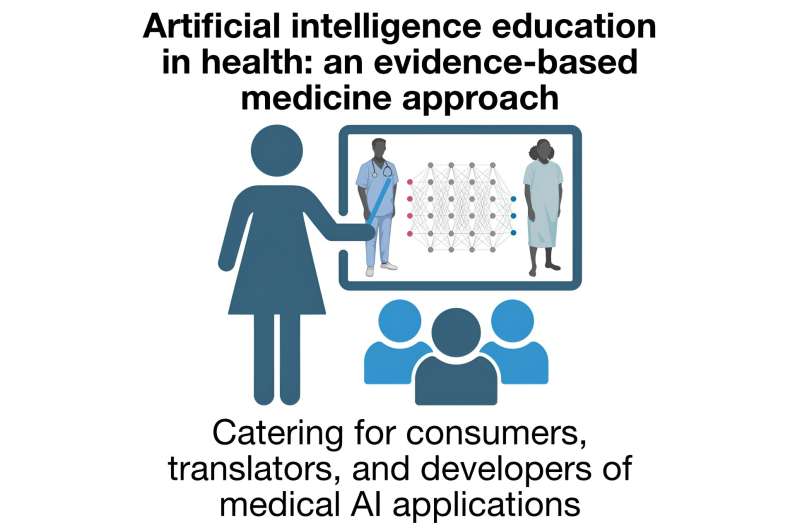This article has been reviewed according to Science X's editorial process and policies. Editors have highlighted the following attributes while ensuring the content's credibility:
fact-checked
peer-reviewed publication
trusted source
proofread
Medical students propose that curricula should be AI-focused

Artificial intelligence should be woven into medical school curricula so that students are conversant with digital technology when they enter medical practice.
A team composed of medical students from local and overseas medical schools has proposed a standardized Artificial Intelligence (AI)-centric medical curriculum to be implemented and taught in medical schools globally. Their suggestion was published in Cell Reports Medicine, titled "Artificial Intelligence Education: An evidence-based medicine approach for consumers, translators and developers."
The AI curriculum is designed for future health care practitioners and will comprise of four pillars—technical concepts, validation, ethics and appraisal. Such an AI-based curriculum will cater to the differing levels of familiarity and competency of the students, which the paper's authors have classified as consumers, translators and developers.
The first group comprises all users of AI who require adequate knowledge to sift out suitable AI tools that can be used effectively for patients' diagnoses and care in clinical settings. Translators are advanced users with more in-depth understanding of data structures and AI patterns, who are capable of applying different machine learning tasks allowing optimal representation and interpretation of available data to meet clinical needs.
Developers would then focus on designing and developing the overall AI operational flow, possessing the understanding and knowledge to apply new architectures, hence driving the creation of novel applications for health care using patient data. With their backgrounds in both the clinical and computational scenes, developers would be best placed to assist both consumers and translators to implement new applications of AI, while safeguarding patients' welfare and interests in the face of emerging technologies.
Currently, there is significant heterogeneity in the provision of AI education in medical schools, ranging from none or basic introductory sessions suited for consumers, to intensive research projects for future translators and developers. The opportunity thus exists to create a universal AI-centered medical education foundation, to draw connections between AI concepts and evidence-based medicine to help develop good clinical reasoning alongside AI literacy.
Differential learning for students of variable aptitudes and backgrounds can be enabled through optional courses and modules broadening and deepening skills in AI. Nonetheless, the curriculum should still cater largely to consumers to prepare them for an ever-changing clinical environment.
A range of teaching formats can be employed, including case-based learning, project work using real-life clinical problems, and peer-to-peer teaching. Interprofessional collaboration can also be advocated for by creating opportunities for students in medicine, allied health, computer science, and engineering to work together.
Year 5 NUS Yong Loo Lin School of Medicine student and the paper's lead author, Faye Ng Yu Ci said, "As AI applications continue to proliferate in health care, the need to educate medical students to effectively appraise and use these tools is becoming more pressing. As doctors, we need to future-proof ourselves by acquiring a strong understanding of AI and its principles, so we can incorporate digitalization into clinical workflows in the future to improve patient care and outcomes."
At the recent AI Health Summit 2023, Associate Professor Daniel Ting, from Duke-NUS Medical School and the SingHealth AI Office, who is also corresponding author, reiterated the commitment to improve AI and data literacy of the health care workers within and outside Singapore, by establishing SingHealth-AI Singapore partnerships that aim to co-develop an AI in Health curriculum. "Ultimately, we hope to educate all the health care professionals and patients to be safe and responsible users, leveraging on the cutting-edge AI and digital technologies to enable healthier local and global populations."
Speaking at the same summit event, Professor Joseph Sung, dean of Lee Kong Chian School of Medicine at Nanyang Technological University emphasized the need for medical and nursing students to gain early exposure to these technologies, so that they are armed with an understanding of both the practicalities of these technologies and their potential use cases, equipping them to become co-pilots in advancing AI in clinical practices in future.
A precedent has already been established at NUS Medicine, which has introduced a compulsory Minor in Biomedical Informatics for all its undergraduates. The curriculum trains students to decipher and interpret data by using a combination of data science, AI and information technology to improve patient outcomes and information flow across health care systems.
Professor Chong Yap Seng, dean of NUS Medicine, said, "We have entered an era where AI and machine learning is commonplace. Our medical and nursing students need to be trained to have a competitive advantage. This means exposing them to different possibilities and scenarios that would allow them room to exercise critical thinking on how best they can apply their clinical skills to complement the vast potential of the current digital landscape, that could radically change the trajectory of medical and scientific advances for the better and usher in a new era of possibilities in digital health therapeutics."
Professor Thomas Coffman, dean of Duke-NUS, agreed, "The large language models of today are poised to transform the way we provide clinical care. As such, our medical and nursing students, and especially our faculty, need to be trained and prepared to use this powerful new tool, but also to recognize its limitations and downsides."
More information: Faye Yu Ci Ng et al, Artificial intelligence education: An evidence-based medicine approach for consumers, translators, and developers, Cell Reports Medicine (2023). DOI: 10.1016/j.xcrm.2023.101230



















